外研社新标准八年级英语上册教案M3U3
外研版英语八年级上册Module 3《Sports》全单元教学设计

外研版英语八年级上册Module 3《Sports》全单元教学设计一. 教材分析《Sports》是外研版英语八年级上册Module 3的主题单元,主要介绍体育运动的相关知识。
本单元包括介绍运动项目的短文、运动器材的词汇、以及关于运动的句子。
教材内容丰富,贴近学生生活,有利于激发学生的学习兴趣。
二. 学情分析八年级的学生对体育运动有较高的兴趣,生活中也经常参与各种运动。
但部分学生在英语表达方面仍有困难,需要教师关注并提供个别辅导。
此外,学生们的团队合作意识和运动知识水平不同,需要在教学过程中加以考虑。
三. 教学目标1.知识目标:学生能掌握本单元的运动项目名称、运动器材词汇以及相关句子。
2.能力目标:学生能运用所学知识进行简单的英语交流,如谈论喜欢的运动、介绍运动项目等。
3.情感目标:培养学生积极参与运动的意识,提高团队合作精神。
四. 教学重难点1.重点:运动项目名称、运动器材词汇以及相关句子的掌握。
2.难点:运动项目名称和运动器材词汇的准确运用,以及句子结构的灵活运用。
五. 教学方法采用任务型教学法、情境教学法和分组合作教学法。
通过设定各种运动情境,引导学生进行英语交流,提高学生的实际运用能力。
同时,分组合作完成任务,培养学生的团队合作意识。
六. 教学准备1.准备运动项目的图片、视频等教学资源。
2.准备运动器材的实物或图片。
3.准备相关句子结构的模板。
七. 教学过程1.导入(5分钟)利用图片或视频展示各种运动项目,引导学生谈论自己喜欢的运动。
同时,询问学生对运动项目的了解,为新课的学习营造轻松的氛围。
2.呈现(10分钟)教师展示运动项目的图片,引导学生用英语说出运动项目的名称。
接着,呈现运动器材的实物或图片,让学生用英语表达。
在此过程中,教师给予鼓励和指导,帮助学生克服恐惧心理。
3.操练(10分钟)教师设立各种运动情境,如篮球比赛、足球比赛等,引导学生运用所学知识进行英语交流。
同时,鼓励学生大胆开口,提高口语表达能力。
新外研版八年级上册英语 Module 3 Unit3 教案(教学设计)

Module 3 Sports Unit 3Language in use知识目标单词boring,exciting,relaxing,enjoyable,careless词组better, pleased, pass, pity, chance, loudly句型Table tennis is more exciting than tennis.2) Tennis is…3) Basketball is …4) Football is …5) Swimming is…6) Baseball is…技能目标能区别并能正确使用形容词和副词及其比较级。
能根据本模块所学的知识,介绍自己喜爱的体育项目,并制作海报陈述喜爱的理由及该项目特点。
能够用形容词及其比较级描述运动并制作明信片。
能够运用形容词的比较级形式作出合适的比较。
Step 1 Lead-in1.Show students a short video about different kinds of ball games.2.Have a free talk with students.What’s your favourite sport?Step 2 Work in pairs.1. Ask the students to use the words in the box in Activity 1.boring cheap difficult easy exciting expensive popular relaxing2. Ask the students to look at the pictures in Activity 1 carefully.3. Talk about the sports.4. Read through the example with the class.Step 3 Language practice1. Read through the example sentences in the box with the whole class.2. Ask the students to repeat the sentences in the box.Step 4 GrammarStep 5 Exercises一、写出下列形容词的副词。
外研版英语八年级上册M3Unit3《Languageinuse》教学设计

外研版英语八年级上册M3 Unit 3《Language in use》教学设计一. 教材分析《外研版英语八年级上册》M3 Unit 3《Language in use》主要围绕着语言的使用展开,让学生学会在不同的情境下使用恰当的语言。
本节课的主要内容包括日常用语、电话用语和电子邮件用语等。
通过本节课的学习,学生能够掌握这些语言表达方式,并在日常生活中灵活运用。
二. 学情分析八年级的学生已经具备了一定的英语基础,对于日常的交流和表达已经没有太大的问题。
但是,他们在电话和电子邮件等方面的语言表达可能会显得有些欠缺。
因此,在教学过程中,教师需要针对这些方面进行重点的引导和训练。
三. 教学目标1.知识目标:学生能够掌握日常用语、电话用语和电子邮件用语等表达方式。
2.能力目标:学生能够在日常生活中灵活运用这些语言表达方式。
3.情感目标:学生能够提高对英语学习的兴趣,增强自信心。
四. 教学重难点1.重点:让学生掌握日常用语、电话用语和电子邮件用语等表达方式。
2.难点:让学生能够在日常生活中灵活运用这些语言表达方式。
五. 教学方法1.情境教学法:通过设定不同的情境,让学生在实际环境中学习和运用语言。
2.交互式教学法:教师与学生、学生与学生之间的互动,提高学生的参与度和积极性。
3.任务型教学法:通过完成不同的任务,让学生在实践中学习和运用语言。
六. 教学准备1.教师准备:备好相关的教学材料和课件,准备好不同的情境道具。
2.学生准备:提前让学生预习相关的内容,准备好进行课堂互动。
七. 教学过程1.导入(5分钟)教师通过设置一个日常交流的情境,如在商店购物,引出本节课的主题——日常用语。
2.呈现(10分钟)教师通过课件展示不同的日常用语,如问候、介绍、道别等,并让学生进行实际的操作练习。
3.操练(10分钟)教师设置一个电话交流的情境,让学生模拟电话对话,练习电话用语。
4.巩固(10分钟)教师通过一个电子邮件的交流情境,让学生练习电子邮件用语,巩固本节课所学的内容。
新外研版八年级英语上册Module3教学案

新外研版八年级英语上册Module3教学案Module3教学案一、学习目标:1.通过学习会正确使用下列单词:baseball, volleyball, boring, exciting, relaxing, enjoyable, miss, mind等,并熟练掌握下列词组:look tired, be sure, that’s because, what’s the matter等,及对比运动特点的几种句型.2.通过听力训练,能听懂关于运动的对话,并能用比较级描述对运动的喜好。
3.学会描述运动,对比不同运动的特点二、学习重难点:能听懂关于运动的对话、学会用比较级描述对运动的喜好三、学法:自主、合作、展示四、课型:新授课3课型3课时Unit 1 Nothing is more enjoyable than playing tennis.第一课型自主学习+精讲点拨学习目标:1.通过自主学习掌握本单元基本的单词、短语和句子,能够根据汉语及音标写出单词。
2.掌握基本的听说技巧,能听懂关于关于运动的对话,完成相应的练习。
3.热爱运动,激发自己运动的兴趣。
第一学段:自主学习(根据对话和教学案知识点完成单词、短语和重点句子的基本学习,约15分钟)1. 重点单词1) 烦人的,无聊的 2)排球 3)得分4)体育场 5)大量 67)['r?'l?ks??] 82. 重点短语1) 打棒球 2)看起来累 ________ 3)那是因为4)真倒霉 5) 大量/充足时间 6)擅长3. 重点句子1)来看电视上的足球赛!2)没有什么比打网球更有意思。
3)在家待着比去体育馆更简单。
4. 读课文,然后根据自己的实际情况完成下列短文My favourite sport is _______________.And I enjoy watching _________________. I am quite good at ________________.I don’t like playing_________________. And I am bad at_____________.精讲点拨(教师根据学生自主学习任务收集到的学情,把对话中的重点和难理解的知识点进行精讲点拨,用时约15分钟)1[观察]Last week the match on TV was so boring because no one scored at all. 上周电视上的比赛真无聊,因为根本就没有人得分。
外研社初中英语八年级上册教案Module 3 Unit 3 Language in use

Practising reading.
predictions are correct.
* Play the recording again for the students to answer the questions.
Read the sentences first. Then read the passage again and underline the key
设
计
Reflection
TB:小初高题库
外研社版初中英语
相信自己,就能走向成功的第一步 教师不光要传授知识,还要告诉学生学会生活。数学思维
可以让他们更理性地看待人生
TB:小初高题库
comparative.
• Read through the
sentences, complete the
3.练习形容词和副词的区别。 4. Complete the passage with the correct form of the words in brackets.
sentences individually and then check the answers in pairs. Talk about the missing words in each,complete the
TB:小初高题库
外研社版初中英语
综合 归纳 多元 应用
整 理 提 高
五、Practising reading.
information to help
6. Read the passage and complete the sentences.
complete the sentences.
Complete the sentences and
外研版八年级上册:Module-3--Sports-单元精美教案设计
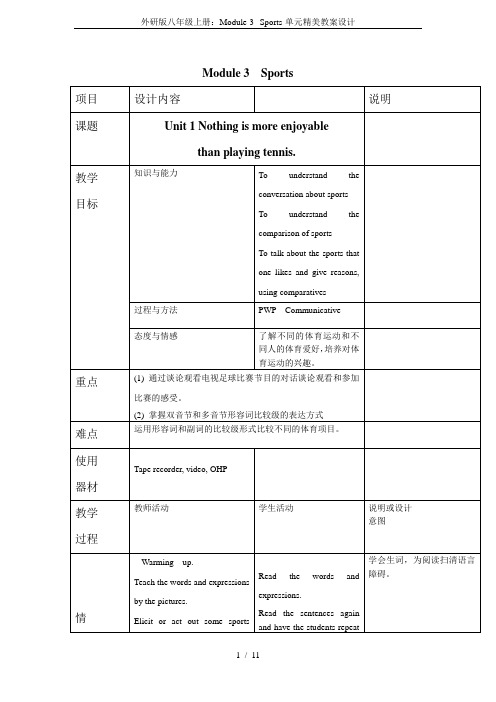
过程与方法
PWP Communicative
态度与情感
了解不同的体育运动和不同人的体育爱好,培养对体育运动的兴趣。
重点
(1)通过谈论观看电视足球比赛节目的对话谈论观看和参加比赛的感受。
Module 3 Sports
项目
设计内容
说明
课题
Unit 1 Nothing is more enjoyable
than playing tennis.
教学
目标
知识与能力
To understand the conversation about sports
To understand the comparison of sports
* Play the recording again and ask the students to number the sports in the box.
• Ask them to read the passage and check whether their guesses and predictions were right
2.Look at the sports in Activity 1 and talk about them.(引入多音节形容词的比较级)通过谈论各种体育运动,学习多音节形容词做比较的方法。
3.Activity3.
Tell the students they are going to listen and read a conversation among Tony, Darning and Betty.
【外研社新标准英语】初中初二上module 1 (unit 1-3)精品英语教案03

It’s + adj. + to do sth.
Read loudly and try to understand the meaning of every sentence ,then use them to make some sentences.
3.
情
景
操
练
1.Listening practice.
Unit 3 Language in use
上课教师
john
学生年级
初二
教材
《英语》(新标准)
课时
一课时
教学设计
教学内容
Unit 3 Language in use
教材分析
The unit is to check if the students can use the key vocabulary and new words they learn in this unit to express what they want others to know.
2.Look at the picture and say what Jack usually does.
3.Tell him how to be a good student.
4.Work in pairs. Read and give advice.
5.Do part 6 and check the answers in pairs.
Play the tape and finish off part 1 and 2.
2.Show six pictures. Ask them to talk about them and say if Jack is a good student.
外研版八年级上英语Module3_教案(三个单元全有)

Module 3 SportsUnit1 Nothing is more enjoyable than playing tennis.(2 periods)Teaching aims: (1)To understand the conversation about the sports. (2)To understand the comparison of sports.(3)To talk about the sports that that one likes and gives reasons, using comparatives.Teaching key points:Key vocabulary:baseball, volleyball, boring, exciting,relaxing ,matter, hurt, stadium, miss, mind, plenty, plenty ofKey structures:Watching is not dangerous and it’s more relaxing too! And staying at home was easier than going to the stadium.Teaching difficulties: the use of comparative degree of adjectives with two or more than two syllables.Teaching steps:Step1 Greetings“How are you?”“What’s the weather like today?”Step2 Lead-in1.Ask students some questions. “How was your weekend? What do youusually do at the weekend? Do you usually do some sports at the weekend? Who does some sports at the weekend? ”2.Say “ I usually do some sports at the weekend. I think it is good forour health. Do you agree with me ?So today let’s talk about sports. 3.Look at the picture, what is he doing? ( He is playing tennis)I likeplaying tennis very much, I think it’s very enjoyable. I think nothing is more enjoyable than playing tennis.Step3 Presentation/ V ocabulary/ Speaking1.Show students some pictures about sports. Elicit basketball, football,table tennis, volleyball, tennis and baseball2.Say “I like basketball very much, because it’s very exciting andrelaxing. Ask students “ what sports do you like?Why?”Give the students more pictures about sports.3.Elicit the answers from the students and elicit some adjectives.4.Continue to say “I don’t like baseball, because it’s very boring anddifficult.”Ask students “How about you? Can you tell me what sports you don’t like?”5.Elicit the answers from the students and elicit some adjectives andwrite them on the blackboard.6.Read the adjectives on the blackboard together.7.The teacher says “I’m not only like playing basketball, but also likeswimming. But I think swimming is more relaxing than playing basketball.”8.Ask students to make sentences like the example.9.Students say their sentences one by one.10.W ork in pairs , ask and answer.Step4 Listen and read1. Read the words in the box in Activity 1 chorally.2. Match the word with the pictures.3. Say “Just now we talked about our favourite sports , Daming and Betty also like sports very much. Let’s listen to the recording and find out what sports they like. When you are listen, you should check the true sentences as you hear them.”4. Play the recording and listen for the first time. Listen again and ask the students to check their answers.5. Do activity plete the sentences with the words in the box. And then check the answer together.Step5 Pronunciation and speakingListen and notice how the speaker links the words. Listen again and repeat.Homework: Copy the new words and try to remember them.Read the conversation with your partner.The designing of the blackboardModule 3 SportsUnit1 Nothing is more enjoyable than playing tennis. swimming is more relaxing than playing basketball.This week’s match is more exciting.Staying at home is easier than going to the stadium.Reflection:_______________________________________________________________________________________Unit2 This year we are training more careful.(2 periods)Teaching aims:(1)To skim the text on sports and understand its main idea.(2)To be able to describe sports and games, using the comparative forms of adjectives.(3) To make comparison with given information.Teaching key points:Key vocabulary:beat/careless/coach/fan club/against/practice/warm/ warm up/usual/better/pass/ pity/loudly/trainKey structures:We all arrive as early as we can so that we have time to warm up.It’s more difficult to practice in winter.It gets dark earlier.This year we are training more carefully.That means we have a better chance of winning.Teaching difficulties: To be able to use imperative sentencesTeaching steps:Step1 GreetingsStep2 RevisionRevise the sports we talked about in last class.Step3 Lead-in1.Show students two pictures on page 20, ask them what sport it is and what people are doing in the picture.2.Students have discussion about the picturesStep4 Vocabulary/ Presentation1.Students say something about the pictures.e the pictures to elicit the new words. Beat, cheer…on, coach, fanclub, play against, train, pleased, pity, loudly, confident.3.Read and repeat the new words chorally.Step5 Reading1.Tell students to look at the title of the passage by Daming and askthem what the passage is about. Ask them to guess what sport he is training for.2.Elicit the ideas from the class.3.Write some general pre-reading questions on the board for the studentsto focus on while they are reading.Why is Daming going to school on Saturday?How does the team practice this year?Why is it good to have fans around?4.Read the passage, students check their guesses and answer thequestions.5.Elicit answers to the questions from the class.6.Listen and read the passage.plete the table after the passage. Read the passage again,underline the key information and complete the table.Step5 Exercises1.Activity3.2. Activity4Homework: 1. Copy the new words and try to remember them2. Finish Activity5 and 6 on Page21.The designing of the blackboardModule 3 SportsUnit2 This year we are training more careful.We all arrive as early as we can so that we have time to warm up.It’s more difficult to practice in winter. It gets dark earlier.This year we are training more carefully.That means we have a better chance of winning.Reflection: __________________________________________________________________________________Unit3 Language in use(2 periods)Teaching aims: To summarise and consolidate the use of comparatives.To practise using adverbs after verbs and distinguishadverbs from adjectives.Teaching steps:Step1. Preparation/ Language PracticeGo through the sentences in the practice box with the students.Read the sentences together.Step2. Activity1Put the students into pairs and ask them to quickly identify the sports in the pictures. Tell them to say whether they play the sports and which are their favourites. “What’s your favourite sport?”“My favourite sport is swimming. It’s exciting.”Step3. Activity2Read through the sentences with the students. Elict the comparative forms of the words in brackets. Tell the students to complete the sentences individually and then check the answers in pairs.Step4. Activity3Read through the examples with the students.Talk about the missing words in each. Tell the students to read the sentences first and decide if the word in brackets needs to be changed.Step5. Activity4Ask the students to read the passage quickly to find out what is about. Ask them to read it again and decide if the missing are comparing two things or just describing something. Then complete the passage.Step6. Activity5Ask the students to read the questions quickly, and predict what the recording is about. Play the recording twice, then check the answer.Step7. Activity6Tell the students to read the sentences first. Then read the passage again and underline the key information to help them complete the sentences.Homework:Work in group of four to make a sports poster. Talk about your favourite Olympic Sports and choose one for your poster.The designing of the blackboardModule 3 SportsUnit 3 Language in useWhat’s your favourite sport?My favourite sport is swimming. It’s exciting.Reflection: __________________________________________________________________________________。
外研版-英语-八上-Module3 3单元 教学设计
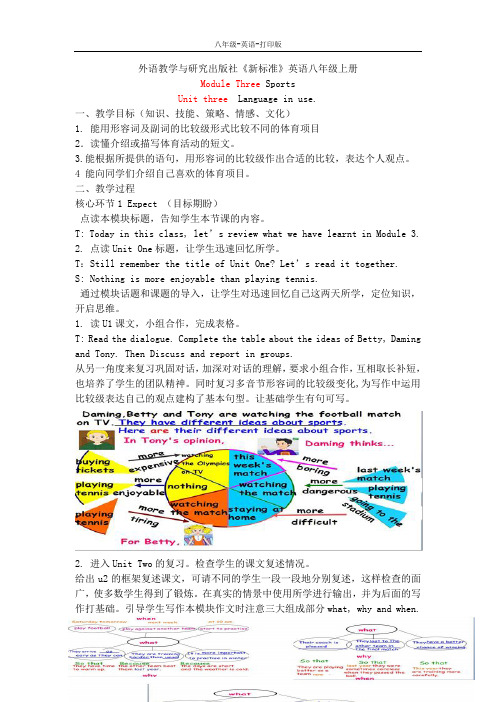
外语教学与研究出版社《新标准》英语八年级上册Module Three SportsUnit three Language in use.一、教学目标(知识、技能、策略、情感、文化)1. 能用形容词及副词的比较级形式比较不同的体育项目2.读懂介绍或描写体育活动的短文。
3.能根据所提供的语句,用形容词的比较级作出合适的比较,表达个人观点。
4 能向同学们介绍自己喜欢的体育项目。
二、教学过程核心环节1 Expect (目标期盼)点读本模块标题,告知学生本节课的内容。
T: Today in this class, let’s review what we have learnt in Module 3.2. 点读Unit One标题,让学生迅速回忆所学。
T:Still remember the title of Unit One? Let’s read it together.S: Nothing is more enjoyable than playing tennis.通过模块话题和课题的导入,让学生对迅速回忆自己这两天所学,定位知识,开启思维。
1. 读U1课文,小组合作,完成表格。
T: Read the dialogue. Complete the table about the ideas of Betty, Daming and Tony. Then Discuss and report in groups.从另一角度来复习巩固对话,加深对对话的理解,要求小组合作,互相取长补短,也培养了学生的团队精神。
同时复习多音节形容词的比较级变化,为写作中运用比较级表达自己的观点建构了基本句型。
让基础学生有句可写。
2. 进入Unit Two的复习。
检查学生的课文复述情况。
给出u2的框架复述课文,可请不同的学生一段一段地分别复述,这样检查的面广,使多数学生得到了锻炼。
在真实的情景中使用所学进行输出,并为后面的写作打基础。
最新外研版八年级上册英语精品教案:-Module 3 Unit 3教案
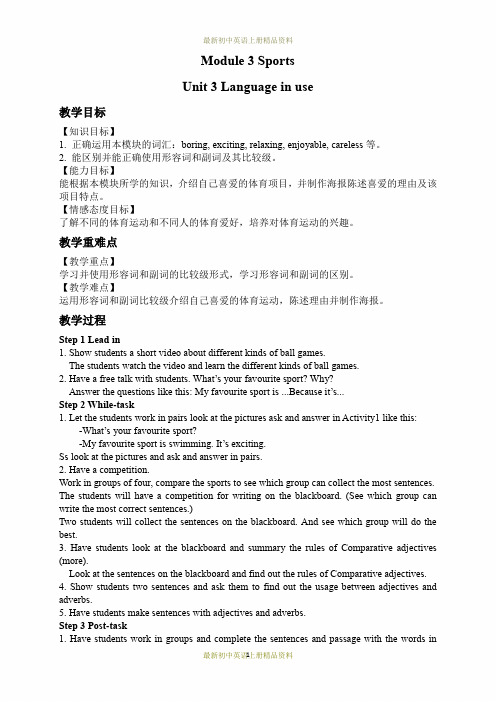
Module 3 SportsUnit 3 Language in use教学目标【知识目标】1. 正确运用本模块的词汇:boring, exciting, relaxing, enjoyable, careless等。
2. 能区别并能正确使用形容词和副词及其比较级。
【能力目标】能根据本模块所学的知识,介绍自己喜爱的体育项目,并制作海报陈述喜爱的理由及该项目特点。
【情感态度目标】了解不同的体育运动和不同人的体育爱好,培养对体育运动的兴趣。
教学重难点【教学重点】学习并使用形容词和副词的比较级形式,学习形容词和副词的区别。
【教学难点】运用形容词和副词比较级介绍自己喜爱的体育运动,陈述理由并制作海报。
教学过程Step 1 Lead in1. Show students a short video about different kinds of ball games.The students watch the video and learn the different kinds of ball games.2. Have a free talk with students. What’s your favourite sport? Why?Answer the questions like this: My favourite sport is ...Because it’s...Step 2 While-task1. Let the students work in pairs look at the pictures ask and answer in Activity1 like this:-What’s your favourite sport?-My favourite sport is swimming. It’s exciting.Ss look at the pictures and ask and answer in pairs.2. Have a competition.Work in groups of four, compare the sports to see which group can collect the most sentences. The students will have a competition for writing on the blackboard. (See which group can write the most correct sentences.)Two students will collect the sentences on the blackboard. And see which group will do the best.3. Have students look at the blackboard and summary the rules of Comparative adjectives (more).Look at the sentences on the blackboard and find out the rules of Comparative adjectives.4. Show students two sentences and ask them to find out the usage between adjectives and adverbs.5. Have students make sentences with adjectives and adverbs.Step 3 Post-task1. Have students work in groups and complete the sentences and passage with the words inthe brackets of Activity 2-4.2. Call back the answers.3. Ask the students to work in groups talk about their favourite Olympic sports and make a sports poster.Work in groups talk about their favourite Olympic sports and make a sports poster.A: What’s your favourite Olympic sport?B: My favourite Olympic sport is...A: Why do you like it?B: I like it because...Step 4 SummaryAsk the students to conclude the usage of adjectives and adverbs and their comparative.课堂作业Write an email to your best friend about your favourite sport.教学反思。
外研版八年级上册M3U3教学板书设计
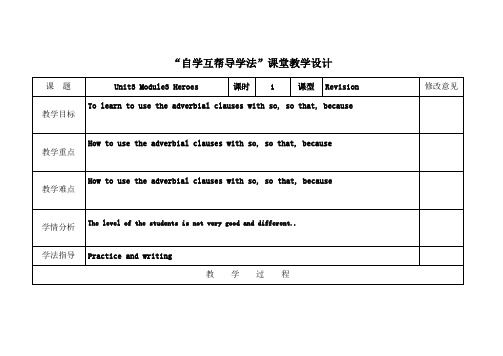
一、Activity 1
二、Activity 2
三、Activities 3,4 , 5,6and 7
……
1、Listen to an English song“英雄hero” to lead in.
2、Revision
Show some words and expressions of the Module.
8、shows the homework
……
1、The students just listen to the song and relax.
2、Ask the students to translate and recite them
3、Letthe studentstosummarythe clauses make some modules.
教学反思
“自学互帮导学法”课堂教学设计
课 题
Unit3 Module3 Heroes
课时
1
课型
Revision
修改意见
教学目标
To learn to use the adverbial clauses with so, so that, because
教学重点
Howto use the adverbial clauses with so, so that, because
6、The teacher asks the students to do some exercises on page22/23 and watches them to do them.
7、The teacher gives the students a quiz to Consolidate theadverbial clauses with so, so that, because
外研版初中英语八年级上册Unit 3 教案

Unit 3 Language in useⅠTeaching modelRevision and applicationⅡTeaching methodFormal and interactive practiceⅢTeaching aims1. Function: Describing and comparing modes of transportation.2. Structure: Superlative adjectives and adverbs (-est, most); irregular superlatives.3. Around the world: The longest railway4. Task: Making a holiday plan for a family trip to a city in China.ⅣTeaching aidsTape recorder, OHP, handoutsⅤTeaching StepsStep 1 RevisionHow do you often travel?Step 2 Language practice1. Read through the example sentences in the box with the whole class.1) It’s the most comfortable way, but it’s the most expensive.2) He lives farthest from school.3) It is the fastest and the second cheapest.4) The more information, the better.2. Ask the students to repeat the sentences in the box.Step 3 Complete the sentences.1. Ask the students to read through the sentences in Activity 1.1) This bus takes the _________ (long) and goes the _________ (slow).2) The new train travels _________ (fast) of all the trains in the world.3) The _________ (cheap) way to get there is by coach.4) I am in a hurry. What’s the _________ (fast) way?5) The fastest way to travel is by plane, but it is also the _________ (expensive).2. Complete the sentence with the correct form of the words in brackets.3. Check the answers.Keys: 1. longest slowest 2. fastest 3. cheapest 4. fastest 5. most expensiveStep 4 Complete the conversation.1. Ask the students to read through the sentences in Activity2.a) By plane, but you have to go to the airport by taxi and that takes time too.b) The cheapest way is going by train,c) The most comfortable way is going by train, but it takes more time, thangoing by plane.d) There are three ways: by plane, by train and by coach.2. Complete the conversation with the sentences in the box.3. Check the answers.Keys: 1. d 2. a 3. b 4. c5. Read the conversation together.Step 5 Complete the conversation.1. Ask the students to read through the words in the box in Activity 3.2. Read through the conversation in Activity3.A: What’s the (1) __________ way to go to Qingdao?B: We can take a plane but that’s (2) __________. We can also take the train.It’s (3) __________,but it’s not so expensive.B: The coach is the (4) __________ way to go and it takes (5) __________ time.A: So how should we go?B: I think the best way is by train because the train station is the (6) __________ to our home.3. Complete the conversation with the correct form of the words in the box.4. Check the answers.Keys: 1. best 2. the most expensive 3. the slowest 4. cheapest5. the most6. the closest6. Read the conversation together.Step 6 Complete the word map.1. Learning to learnRemember that putting words in groups (for example, bus, train, plane, taxi) makes them easier to learn. Make sure you give your groups a title (for example, Ways of travelling). Remember also that it’s useful to learn expressions as well as the words (for example, take a bus / plane / taxi, bus stop / train station).2. Complete the word map in Activity 4.Step 7 Work in pairs.Choose a place you would like to visit. Ask and answer the questions about the ways by which you can get there.1. What’s the cheapest way to get there?2. What’s the most expensive way to get there?3. What’s the fastest way to get there?4. What’s the most comfortable way to get there?5. What’s the safest way to get there?Step 8 Complete the email.1. Ask the students to read through the words in the box in Activity 6.2. Read through the email in Activity 6.FROM: SallyTO: TonySUBJECT: Journey to ChinaHi Tony,My family is planning a journey to China in the summer. We want to visit Beijing first. Do you think we should (1) _________ the plane tickets early? After Beijing we want to visit Xi’an and Hangzhou, and maybe somewhere else. How can we (2) _________ from Beijing to Xi’an, by train or by plane? The (3) _________ is not so important, but the time is.After Xi’an, we want to go to Hangzhou. Is it better to go to Shanghai first, or can we go from Xi’an to Hangzhou directly?And after Hangzhou what’s the best (4) __________? Can we make a short (5) __________ to Suzhou? What do you think?Thanks for your help.Sally3. Complete the email with the words in the box.4. Check the answers.Keys: 1.book 2. travel 3. cost 4. choice 5. trip5. Read together.Step 9 Listening practice.1. Ask the students to read through the information in Activity 7 individually.2. Play the tape.3. Listen and match the cities with the information.4. Ask the students to check with a partner.5. Check the answers.Step 10 Listening practice.1. Ask the students to read through the questions in Activity 8 individually.1) Which city has the largest population?2) Which cities have the oldest universities in the world?3) Which city is the nearest to London?4) What are the popular places for sightseeing in London?2. Play the tape.3. Listen again and answer the questions.4. Check the answers.Step 11 Around the world: The longest railway1. Ask the students to look at the picture and discuss what they can see.2. Read through the information with the whole class.The Trans-Siberian Railway is the longest railway in the world. You can go from Moscow, the capital of Russia, to Vladivostok on the east coast. It is not the fastest way to travel from Moscow to Vladivostok, but it is the most interesting and also the most comfortable way.3. Talk something about “The longest railway”.Step 12 Module task: Make a holiday plan for a family trip to a city in China. 1. Work in groups. Make a holiday plan for a family trip to a city in China.• Find a map of China. Choose a city to visit and decide on the best way to get there.• Make a list of things to do there.•Present your plan to the class and make notes about other groups’ plans.2. Work in groups. Choose the best plan.• Use your notes to compare the different plans and decide which one is best.I think the trip to Shanghai by train is better because the journey is shorter and there are a lot of interesting places to visit in Shanghai.Step 13 Homework1. Write a holiday plan for a family trip.2. Master the new words and useful expression in Module 4.。
外研版八年级英语上册 Module 3 Unit 3 Language in use教案2 新版外研版
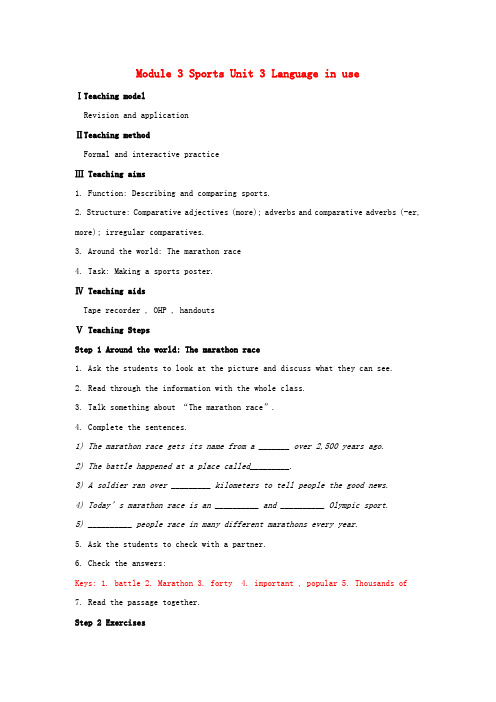
Module 3 Sports Unit 3 Language in useⅠTeaching modelRevision and applicationⅡTeaching methodFormal and interactive practiceⅢ Teaching aims1. Function: Describing and comparing sports.2. Structure: Comparative adjectives (more); adverbs and comparative adverbs (-er, more); irregular comparatives.3. Around the world: The marathon race4. Task: Making a sports poster.Ⅳ Teaching aidsTape recorder , OHP , handoutsⅤ Teaching StepsStep 1 Around the world: The marathon race1. Ask the students to look at the picture and discuss what they can see.2. Read through the information with the whole class.3. Talk something about “The marathon race”.4. Complete the sentences.1) The marathon race gets its name from a _______ over 2,500 years ago.2) The battle happened at a place called_________.3) A soldier ran over _________ kilometers to tell people the good news.4) Today’s marathon race is an __________ and __________ Olympic sport.5) __________ people race in many different marathons every year.5. Ask the students to check with a partner.6. Check the answers:Keys: 1. battle 2. Marathon 3. forty 4. important , popular 5. Thousands of7. Read the passage together.Step 2 Exercises中考链接( ) 1. —Sorry, I can’t follow you. Would you please spe ak ______?— All right. (2012辽宁丹东)A. more slowlyB. more loudlyC. more quicklyD. more quietly ( ) 2. This place is not big enough for Lucy’s birthday party. We should finda _____ one. (2012陕西)A. bigB. smallC. biggerD. smaller( ) 3 — For me, winter is the best season of a year!—Me too. _____ if there’re some snows. I like a white world. (2012浙江金华)A Better B. Worse C Longer D. Shorter( ) 4. _____ children there are in a family, _____ their life will be. (2011济南)A. The less, the betterB. The fewer, the betterC. Fewer, richerD. More, poorer( ) 5. Dear students, please read every sentence carefully. The more ______ you are, the _____ mistakes you’ll make. (2011湖南邵阳)A. carefully, fewerB. careful; lessC. careful; fewer( ) 6. — What do you think of Liu Huan?— Oh, he is my favorite singer. I think no one can sing ______. (2011威海)A. goodB. wellC. better D best( ) 7. Jack is good at drawing. I think no one draws ________. (2011安徽)A. betterB. bestC. worseD. worst( ) 8. Mum, this T-shirt is much too small for me. Would you buy me a ______ one?(2011江西)A. niceB. largeC. nicerD. largerKeys: 1. A 2. C 3. A 4. B 5. C 6. C 7. A 8. DStep 3 Module task: Making a sports poster1. Work in groups. Talk about your favourite Olympic sport. Say why you like it. A: What’s your favourite Olympic sport?B: My favourite Olympic sport is …A: Why do you like it?B: I like it because…2. Make a poster. Find a photo for your favourite sport and include it in the poster.Our favourite Olympic sportOur favourite Olympic sport is swimming / table tennis/…We like it because it is exciting, popular…It is more exciting than3. Show your poster to your classmates.。
初中英语外研八年级上册(2023年新编)Module 3 Sports教学设计

Module Three SportsUnit Two This year we are training more carefully.一、教学目标To understand the conversation about sports.To understand the comparison of sports.To talk about the sports that that one likes and gives reasons, using comparatives.二、教学过程Stepl. Lead-in1.Show the study aims.2.Ask and answer.T: Do you like watching the Olympics? How many Olympics champions do you know?Step2. PresentationEnjoy a movie.T: They trained very hard for the gold medal. Now lefs enjoy a piece of video to see how top football players train.1.Discuss.Step3. ReadingAsk students to read fast and answer the questions. Check the answers together.Title:Writer:Where may the passage come from?A. A newspaper.B. A notice.C. A diary. .D. A story book.1.Ask students to read for each paragraph J s main idea.SimmingRead and match.Paral: (2) coach is pleased with us now.are training harder than usual because the other school beat us last year. Para2: (4) will make us feel more confident to have more fans around us and cheer us on. Para3: (1)Para4: (3) is more difficult to practise because of the short days and the cold weather.2.Ask students to read careful 1y.ScanningComplete the table.With the help of the box and given words , retell the story and then act out the story in groups .Step5. Homeworkmore adj.in Language use part.。
外研版英语八年级上册Module3 Unit3 精品教案 (2)

Unit3 精品教案Teaching modelRevision and applicationTeaching aims:1.掌握副词的根本用法以及副词比拟级的用法。
2.掌握并熟练运用多音节形容词及局部双音节形容词的比拟级的用法。
3.掌握比拟级特殊用法:the +比拟级,the +比拟级Teaching key points:语法:掌握副词的根本用法以及副词比拟级的用法。
比拟级特殊用法:the +比拟级,the +比拟级句型:1. My favorite sport is...我最喜欢的体育工程是......2. In the mornings and evenings you can see people jogging in parks or along city streets.3. The more you go jogging, the longer you will run and you the healthier you will feel.Teaching difficulties:形容词和副词的比拟级构成以及用法Teaching aidsTape recorder, OHPTeaching StepsStep 1 RevisionShow some pictures to review the text of Unit 1 and Unit 2Step 2 Language practice1. Read through the example sentences in the box with the whole class.2. Ask the students to repeat the sentences in the box.Step 3 Work in pairs and talk about sports1. Look at the pictures in activity 1.2. Let Ss talk about sports and ask some of them to make a dialogue.Step 4 Do activity21. Ask the students to read the sentences carefully.2. Let Ss finish them.3. Check the answers:4. Let the Ss read the sentences by themselves.Step 5 Do activity31. Ask the students to read the sentences carefully and finish them.2. Ask the students to check with a partner.3. Check the answers:4. Read the sentences together.Step 6 Complete the passage1. Ask the students to read through the conversation.2. Complete the conversation with the correct form of the words.3. Ask the students to check with a partner.4. Check the answers5. Ask some students to read the passage.Step 7 Listening1. Listen and choose the correct answer.2. Check the answers.3. Listen and complete the sentences.4. Check the answers.Step 8 Around the world1. Ask the students to look at the picture and discuss what they can see.2. Read through the information with the whole class.3. Talk something about “The marathon race〞.Step 9 Module task1. Let Ss talk about their favourite sports.2. Choose one sport for their poster.3. Work in pairs and make a poster.Step 10 Homework。
外研版八年级英语上册教案(三)
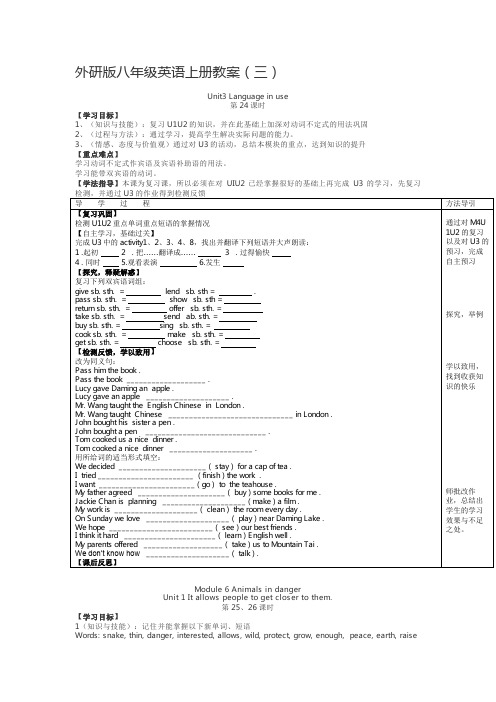
学习动词不定式作宾语及宾语补助语的用法。
学习能带双宾语的动词。
【学法指导】本课为复习课,所以必须在对UIU2已经掌握很好的基础上再完成U3的学习,先复习检测,并通过U3的作业得到检测反馈
导 学 过 程
方法导引
【复习巩固】
检测U1U2重点单词重点短语的掌握情况
【自主学习,基础过关】
完成U3中的activity1、2、3、4、8,找出并翻译下列短语并大声朗读:
Lucy gave Daming an apple .
Lucy gave an apple ____________________ .
Mr. Wang taught the English Chinese in London .
Mr. Wang taught Chinese ______________________________ in London .
课后反思:
先自主拼读单词,再跟点读笔读,纠正发音,熟读后完成自主检测一题。
熟读Activity3总结出短语以及重点句子,完成activity4提出疑惑。
合作探究,需要小组成员配合完成,等级不等成员之间要互相帮助,对完成的探究案,每个成员都要知道答案是怎样得来的。
在自主预习与师的引导与补充后,完成当堂检测,
3.Many wild animals don’t have a safe placetolive .
4.Also , often there isn’t enough cleanwater, because we’ve made it dirty .
2.难点:动词不定式作宾语补足语和作状语的用法。
单项选择:
( ) 1 . The boy is __________ to look after himself .
初中英语外研八年级上册(2023年新编)Module 3 Sports教案
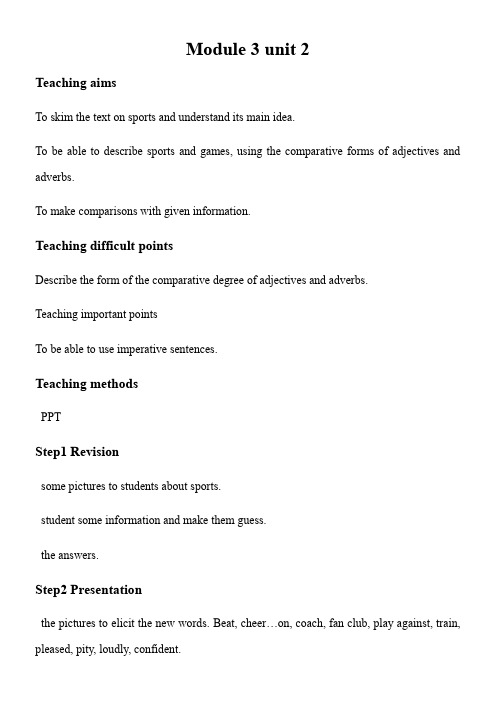
Module 3 unit 2Teaching aimsTo skim the text on sports and understand its main idea.To be able to describe sports and games, using the comparative forms of adjectives and adverbs.To make comparisons with given information.Teaching difficult pointsDescribe the form of the comparative degree of adjectives and adverbs.Teaching important pointsTo be able to use imperative sentences.Teaching methodsPPTStep1 Revisionsome pictures to students about sports.student some information and make them guess.the answers.Step2 Presentationthe pictures to elicit the new words. Beat, cheer…on, coach, fan club, play against, train, pleased, pity, loudly, confident.the new words.Step3 Work in pairs.the students to look at the pictures in Activity 1.(use the words and expressions in the box.)Step4 Readingstudents to look at the title of the passage by Daming and ask them what the passage is about. Ask them to guess what sport he is training for.2. Write some general pre-reading questions on the board for the students to focus on while they are reading.1)Why is Daming going to school on Saturday?2)How does the team practice this year?3)Why is it good to have fans around?4. Elicit answers to the questions from the class.students finish the table.6. Check the answers to the questions around the class.Step5. Complete the passage with the words in the box.Read the words in the box with the class and check the meaning.Step6. Important sentences and expressions.Homework.。
- 1、下载文档前请自行甄别文档内容的完整性,平台不提供额外的编辑、内容补充、找答案等附加服务。
- 2、"仅部分预览"的文档,不可在线预览部分如存在完整性等问题,可反馈申请退款(可完整预览的文档不适用该条件!)。
- 3、如文档侵犯您的权益,请联系客服反馈,我们会尽快为您处理(人工客服工作时间:9:00-18:30)。
说明:本部分写作活动由三个活动组成。一是写前活动,目的是收集信息。第二步要求学生独立写作。第三步为反馈阶段,教师可根据时间安排,选取一两名学生的习作进行适当评议。
课堂小结
总结本模块的所有重点的词汇、征求和提供建议的句型句式。
本活动要求学生根据相应的情境编写对话,通过口头交际练习形容词比较级。
Step 2 Exercise
Activity34
Step 3 Listening Practice
1. Listen to the tape. Check the expressions of advice that you hear.
1. Talk about "How to be a good student?". Try to give more advice.
2. Pairwork. Ask them to take it in turns to say what their problem is and offer a solution.
课后作业
1. Do some exercises. 2. Revise the words and sentence patterns.
板书设计
Unit 2 This year we are training more carefully
1.so that
2.play against
3.it is more difficult to do sth
2. Listen again and check the correct sentences.
说明:本活动要求学生根据听力材料判断信息正确与否。着重培养学生选择注意的能力和主题理解能力。
Step 4 Discussion Activity3
1. Look at the pictures together and decide what Jack usually does. Make a list.
说明:说的活动在听的基础上进行。本部分所练习的是提建议的功能。
Step 6 Exercise
Readandwork in pairs or small groups. Activity5
Step 7 Practice
1. Ann wants to be a popular teacher. Give her some advice.
通过本模块的学习,让学生对体育运动产生兴趣并且喜欢上体育运动,让体育融入到学生的生活中去。
教学重点
.英语学习的相关单词及多音节单词的形容词比较级的用法。
2.掌握体育运动的相关词汇。
教学难点
及突破
阅读能力的提升。
突破:通过读前,读中,读后三个阶段逐步提升阅读能力。
教学资源
Multi-media
过程设计
4.in winter
5.cheer on
教学反思
平时每一节课很难了解也很难照顾学生对细节的掌握和运用,特别表现为书面和口头时机会就更少了。这一批学生的问题不少,主要表现为动力不足。在学校的“四学”教学模式推动下,学生有这样的表现已使我很欣慰了。
2. Discuss in groups of four. Give advice to Jack. Tell him how to be a good student.
3. Call back some suggestions from the whole class.
Step 5 PairworkActivity4
2. Ann will go for a trip to Xizhang by himself. Give her some advice.
3. Ann is badly ill. Give her some advice.
4. Ann will go to a concert. Give her some advice.
Step 1 Revision and Presentation(Activity 12)
Questions:
1.Which sport do you like better, football or basketball?
2.Which sport is more exciting, baseball or volleyball?
教学设计
年级
八年级
学科
英语
授课
时间
第3模块第3单元
授课
教师
பைடு நூலகம்孙萍
授课题目
Module3 Sport
Unit 3 Language in use
授课方式
(打√)
新授课□习题课□实验课□讲评课□复习课□其他□
学习目标
通过阅读学习掌握一些阅读和词汇的学习策略使学生学会交流学习心得体会,共享学习。
通过学习体育方面词汇的表达方式,理解体育在我们的生活中无处不在,提醒大家平时注意体育锻炼。
